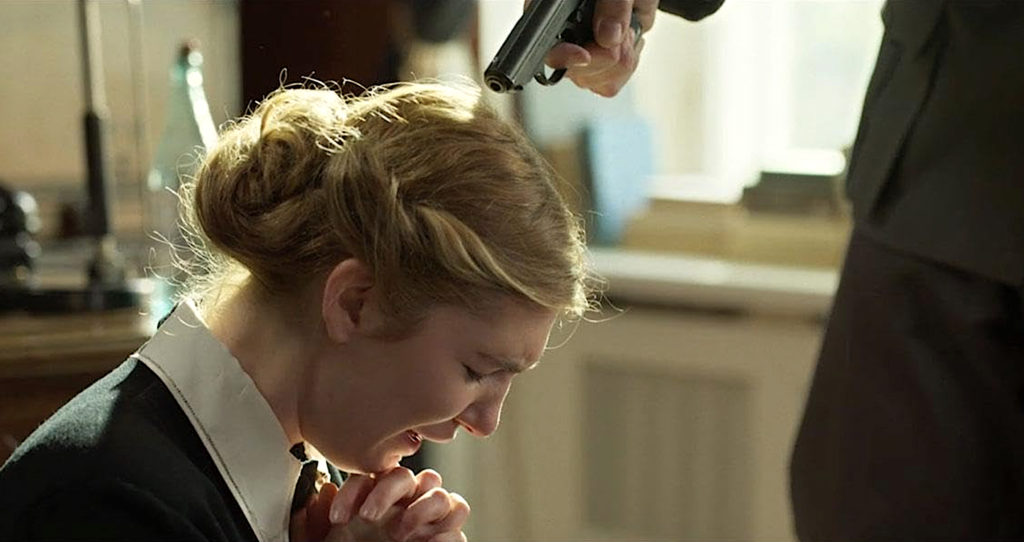Soon after the Nazis invaded Poland in 1939, they set out to make it a “Jew-free” territory. Between 1939 and 1945, German officers oversaw the imprisonment, deportation, and eventual murder of approximately 3 million Jews.
Not all Poles turned their back on their fellow countrymen. They were families like that of Józef and Wiktoria Ulma and their seven children, Catholics who chose to shelter Jewish friends in their own home and were eventually executed by the Nazis for doing so. Last year, the Ulmas were declared martyrs by Pope Francis and beatified.
Despite the terror that such episodes were meant to instill in the Polish population, many heroic men and women continued to hide Jewish fugitives until the end of World War II. Among them was Irena Gut, whose incredible life story is told in the new film “Irena’s Vow,” playing in theaters April 15-16.
Directed by Canadian filmmaker Louise Archambault, “Irena’s Vow” tells an inspiring story of courage and self-neglect with the help of a strong script by Israeli-American screenwriter Dan Gordon and authentic performances from a cast led by Sophie Nélisse (“Yellowjackets,” “The Book Thief”).
Like the Ulma family (and Oskar Schindler, the protagonist of Spielberg’s 1993 epic historical drama), Gut was honored as a “Righteous Among the Nations” by the Israeli Holocaust Commission; a title given to non-Jews who risked their lives by saving Jews during the Holocaust.
St. Pope John Paul II also bestowed a special blessing on Gut in 1995. Today her story is featured in a permanent exhibit in the United States Holocaust Memorial Museum in Washington, D.C.
Gut, a young Polish nurse, was put in charge of a group of Jews employed as tailors and seamstresses in a Nazi-run hotel in her hometown of Radom. None of her employees were actually professional, but like others, had lied about their abilities and credentials to escape the first wave of persecution.
She witnessed firsthand the horrors of the Nazi genocide. In a harrowing scene, we see her witness the vicious murder of a Jewish child and mother, the child crushed to the ground and the mother shot at point blank as she cries over her dead child.
Gut’s vow, for which the film is named, was to never let it happen again. If she could do anything to save a Jewish life, she would. Archamabault’s film depicts how bold, dangerous, and unrealistic her plan was.
Her boss, Wehrmacht Major Eduard Rügemer, moved to a large mansion requisitioned from a Jewish family and asked Irena to become his housekeeper. She accepted and proceeded to hide all of her 12 Jewish employees in the Nazi officer’s house.
Over the next two years, Gut succeeded in hiding her friends until the end of the German occupation, concealing them amid countless Nazi parties, a blackmail scheme, and even the birth of a child.
During the two years of hiding, one of the women became pregnant (the group included married couples). Delivering the baby while hiding, and keeping it hidden, seemed impossible, so one of the Jewish refugees, a doctor, asked Gut to provide him with the means to perform an abortion.
Gut refused to do so, citing her Catholic faith. “I am not going to help Hitler get another Jewish baby.” “If we don’t have this baby” she adds, “something else will die inside of us too.”
The child was born, and miraculously survived. At the end of the film, you can see real footage of Gut’s encounter with him after the war. “This is my baby,” she says in the clip as she hugs him.
Gut’s heroic protection of the unborn, whom she regarded as no less worthy of risking her life for than the adult parents, echo Mother Teresa’s timeless words on abortion.
The late saint regularly reminded wealthy western countries — particularly ones that expressed concern for the death of children from poverty or war in poorer countries — that they were forgetting the “war against the child” waged within their borders, and the “millions being killed.”
According to Mother Teresa, one has to be willing to suffer, to risk one’s life and time, to ensure that the child and mother are taken care of. “How do we persuade a woman not to have an abortion?” she once asked. “As always, we must persuade her with love and we remind ourselves that love means to be willing to give until it hurts.”
Gut was willing to give until it hurts, and her sacrifice bore much fruit. All of the Jews she hid survived, and so did Gut, who after the war married an American citizen and moved to the U.S. She died in Orange County in 2003.
As winds of war blow over much of the world, this film presents an inspiring example of what it means to live one’s faith in dramatic times. It is an appropriate movie for the Easter season, as it presents us with a woman who followed to the letter Jesus’ command at the Last Supper: “This is my commandment: love one another as I love you. No one has greater love than this, to lay down one’s life for one’s friends. You are my friends if you do what I command you.”

